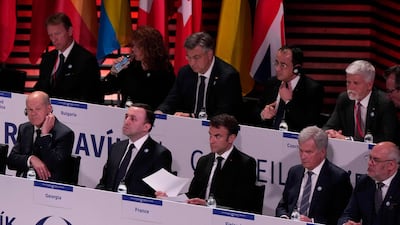The 46 members of the Council of Europe reaffirmed their commitment to Ukraine and to democratic values at the body’s first summit since Russia’s expulsion last year.
The council is a human rights organisation that is separate from the EU.
Leaders including German Chancellor Olaf Scholz, French President Emmanuel Macron and British Prime Minister Rishi Sunak were among those who underlined their support for Ukraine in a rare meeting of the council in Iceland, which is only the fourth since it was founded in 1949.
The leaders pledged to hold Russia to account for its war against Ukraine and unveiled a means to track the losses and damage inflicted by Moscow's forces.
They were joined on video link by Ukrainian President Volodymyr Zelenskyy after his tour of European countries to secure more weapons and aid before an anticipated counter-offensive against Russian forces.
Mr Zelenskyy took the opportunity to highlight Kyiv's claims to have shot down Russian hypersonic missiles using new western aid defences.
It showed the country, if united, was capable of anything, he told the summit.
"A year ago, we were not able to shoot down most of the terrorists' missiles, especially ballistic ones," Mr Zelenskyy said.
"And I am asking one thing now. If we are able to do this, is there anything we can't do?"
Russia has denied deliberately attacking civilians while bombing Ukrainian cities, although dozens of towns and cities have been laid to waste by its air strikes and artillery since the invasion began in February last year.
The Reykjavik meeting unveiled a new Register of Damages, a way to record and document evidence and claims of damage, loss or injury incurred as a result of the Russian invasion.
The meeting also sought to address other issues, including the plight of thousands of children taken to Russia or Russian-occupied territories from Ukraine since the start of the war, in what Kyiv and its allies condemn as illegal deportations.
Ukraine and Russia conflict latest - in pictures
"The moment to push back is now," Mr Sunak told the council. "Democracies like ours must build resilience, so that we can out-co-operate and outcompete those who drive instability.
"We will hold Russia accountable for the horrendous war crimes that have been committed and we must also learn the lessons of this war by being prepared to confront threats to our societies before they become too big to deal with."
Earlier on Tuesday, Mr Sunak agreed with Dutch Prime Minister Mark Rutte to “build an international coalition to provide Ukraine with combat air capabilities, supporting with everything from training to procuring F16 jets”, Downing Street said.
Mr Scholz said the council was important "to punish the war crimes of the Russian occupiers and to demand accountability for the enormous damage that Russia inflicts on Ukraine day after day".
France is also looking at how the Paris-based Council of Europe Development Bank can support mental health among Ukrainian civilians, Mr Macron said.
The Strasbourg-based council plays an important role in drawing up and upholding treaties on human rights among its member states. The most famous of these is the European Convention on Human Rights.
“The Council of Europe is often underestimated in its importance,” Frank Schwabe, a German politician who was closely involved in planning the summit, told Reuters.
“The summit will also be about saying what happens if you don't respect the rules.
“The threat of expulsion is already a sharp sword. Even Russia didn't want to leave the Council of Europe. Turkey doesn't want to leave either.”
Russia was initially suspended from the council a day after it invaded Ukraine in February last year. It was then formally excluded on March 16, 2022.
Turkey, which is in the middle of a presidential election, is facing removal after it failed to enact a 2019 court ruling to release jailed businessman and philanthropist Osman Kavala.
The council's Committee of Ministers has launched infringement proceedings against Ankara that have so far stressed dialogue but could eventually lead to Turkey's removal or a suspension of its membership, experts say.
Mr Sunak’s office said that he had discussed challenges posed by illegal migration with Siofra O'Leary, the president of the European Court of Human Rights.
They also held talks over reforms to Rule 39 — the order that stopped the UK sending an inaugural flight of asylum seekers to Rwanda.
Mr Sunak and European Commission President Ursula von der Leyen also agreed to establish a new working arrangement to “strengthen co-operation” between the EU and UK on migration, Downing Street said.
They underlined a “shared interest” in tackling cross-border crime and people trafficking during bilateral discussions at the summit, Downing Street said.
The arrangement would see British agencies working with Frontex, the EU border force, on “critical operational and strategic challenges including the situation in the [English] Channel”, a Downing Street spokesman said.
The UK and the EU will now discuss “the details and operationalisation of this new working arrangement”, Mr Sunak and Ms von der Leyen said.
Iceland’s Foreign Minister Thordis Kolbrun Gylfadottir had told BBC Radio 4 earlier in the day that migration would not be the main focus of the summit.
“The biggest focus is of course Ukraine, and then other issues such as AI [artificial intelligence] and the environment and other things. So this summit doesn’t have a big focus on migration in general,” she said.
“But I agree that that is an issue for Europe. And of course, that system has to develop with the challenges that we face.”
Asked if Iceland and other European nations would consider an overhaul of the rules, Ms Gylfadottir said: “I believe that there will be a discussion on it but there will not be, I think, a real concrete outcome on reforming certain articles.”














